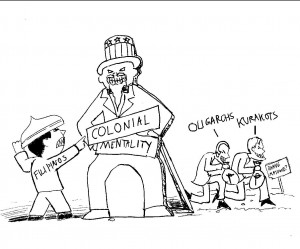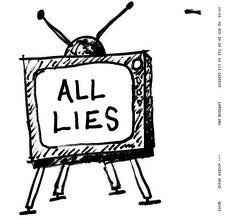 I once blogged about colonial mentality, stating that seeing it as a problem is a myth. After more thought and encountering further opinions on the subject, I still think it is a myth – a dangerous one. A bogeyman, an imaginary monster in the closet. I’ve seen so many discussions where others fiercely blame it for many of the problems of the Philippines and that foreigners are the reason why the country is messed up. But I realize that it’s all a decoy meant to throw us off the course we must take to truly fix our broken nation.
I once blogged about colonial mentality, stating that seeing it as a problem is a myth. After more thought and encountering further opinions on the subject, I still think it is a myth – a dangerous one. A bogeyman, an imaginary monster in the closet. I’ve seen so many discussions where others fiercely blame it for many of the problems of the Philippines and that foreigners are the reason why the country is messed up. But I realize that it’s all a decoy meant to throw us off the course we must take to truly fix our broken nation.
White is Beautiful?
Some often cite the popularity of skin-whitening products as proof of the effect of colonial mentality. But now, someone is debunking this explanation. The Wikipedia entry on Colonial Mentality, indirectly quoting Maria Bernadette L. Abrera of the UP College of Social Sciences and Philosophy, has this to say:
| SUPPORT INDEPENDENT SOCIAL COMMENTARY! Subscribe to our Substack community GRP Insider to receive by email our in-depth free weekly newsletter. Subscribe to our Substack newsletter, GRP Insider! Learn more |
Many Filipinos believe that the idealization of fair skin had its roots during the Spanish colonization. Actually, fairness of complexion was attested as a characteristic of the upper class women and appears as the standard of beauty among the Austronesian peoples of the pre-Hispanic Philippines. The desire for white skin is definitely not a result of colonial mentality during the Spanish rule.
(Postscript: sadly, this text was edited out since then, but the article still quotes the study saying the desire for fair complexion predates colonial rule)
If people say white skin is better, it does not include only Caucasians: Asians, including Chinese, Koreans and Japanese have white-skinned people as well.
And there is another issue, a common analogy used all over the world: the color white is a symbol of cleanliness. The darker, the dirtier. Isn’t that why we sometimes use, “Ang puti ng labada” (the laundry is white) instead of “ang linis ng labada” (the laundry is clean)? I don’t think you can say that this laundry phrase comes from colonial mentality; that would be stretching it.
Creation of an Historical Decoy
Some Filipinos believe that shedding colonial mentality is the way we can move forward. However, after I analyze it, I realize that it is based on a lot of myths and misconceptions. Hatred of colonial mentality is red herring – it distracts us from the real problems. Yet why are we concerned with colonial mentality? What is it that causes people to violently hate it?

One reason is how biased and propaganda-riddled our history education is. We have many biased and history books in our schools that influence our views one way or another. Two major writers of these were Teodoro Agoncillo and Gregorio Zaide.
Gregorio Zaide was anti-Spanish and pro-American. Because his history books were common and became official, he may have been influential in causing even the post-American era young people to chase after American culture (even if American commercialism was already doing that). He may have even taught that Rizal and cohorts wanted independence from Spain, when this is clearly false. Rizal and cohorts wanted the Philippines to be a province of Spain, similar to how some would want the Philippines to be a state of America. Such twisting of history has led to wrong perceptions and growth of anti-foreign hate campaigns.

The net effect of these two historians’ work may have been to promote demonization of anything foreign. Although Zaide promoted America, Agoncillo’s attitude of anti-foreignism became very strong in Filipino culture. Somewhere along the line, the notion of colonial mentality came in to define the “evil” left by our former colonizers.
The Manipulative Media Monster
We always see this slogan, “Kaya din natin,” (we are also capable), “We Filipinos can do it too.” That’s the basis of colonial mentality – Filipinos think of themselves as inferior and look at their colonizers as superior. But hold on; where did this attitude come from? Who told us this?
Perhaps the answer is, the Filipinos never felt inferior before. Perhaps they never did. Until someone gave that idea. Who’s that someone? Local mass media.

In the end, colonial mentality has been used as red herring, just as the use of Villar by the Yellow faction during the election and the use of GMA by media today has led Filipinos on wild goose chases.
What see on TV and radio (even local media) drives us into a love-hate relationship with foreign ideas. We see a lot of skin-whitening products because they are the major sponsors of the shows. As I stated above, what is passed off as colonial mentality is merely commercialism. They are actually part of a new health and wellness fad that uses white skin as a sign of health. The pseudo-patriots or even leftists jump at this to point an accusing finger at “colonial mentalists,” but themselves wear Levi’s jeans and Lacoste shirts while doing this.
Media is also hypocritical in depicting foreigners. They copy American concepts and shows, but portray people from other countries as cruel and inconsiderate. The notion taught is that people from abroad are all bad apples. Media portrays foreigners as robbers and spoilers of our “nation’s wealth” and takes advantage of it to draw attention away from who is actually robbing and spoiling our nation’s wealth.
What to Do?
Of course, I agree that Filipinos have to believe in themselves and work to solve the country’s problems. But it’s not the colonial mentality thing that’s holding them back. It’s not lack of belief in themselves. It’s the lack of means. Such means have been limited thanks to the lack of economic opportunities here.
OFWs go abroad, get separated from their families, get abused and all that. Some people may be blaming foreign countries for taking OFWs. But the cause of the OFW phenomenon is lack of opportunities at home. There are just not enough jobs. And the way to generate jobs, which is to bring the companies here, is being blocked by those using colonial mentality as one of the excuses to oppose foreign investment and want to maintain a monopoly over business in the country.
I do agree that there are some things not worth taking from foreigners. For example, one of our former bloggers has mentioned that the primadonna style of sports from America is being imitated by our basketball stars – and thus they lose to foreign basketball teams. He also claimed that Americans also introduced the idea of racism, saying that while Spanish mingled with with indios, Americans forbade their kids from playing with them. While it may be argued that Spanish also had the indio, insulares and peninsulares descriptions (not to mention that Filipino actually meant only a specific class of people in the archipelago before), such racism may still be around today. We also have rampant consumerism and commercialism that comes from America. These are the things we must practice discernment on.

One other effect of hatred of colonial mentality is not just diversion from the true sources of corruption. The most harmful effect is that it is dividing Filipinos. Some Filipinos are quick to raise a finger and point to other people, blaming them for colonial mentality, while the thieves do their worst under their noses.
It also looks to me that hatred of colonial mentality reflects the mentality that nations SHOULD be enemies. It’s like, ang Pinoy, naghahanap talaga ng away (Pinoys are really looking for a fight). It’s like the teenage gangster picking a fight in the street to try and prove he’s superior to get over his inferiority complex. We’ve been taught that we are oppressed by other countries, so we should pick a fight by blaming them for our problems.
Let’s get rid of this fixation on colonial mentality as a problem: it isn’t. The real problem is that our own corrupt countrymen, who have power both politically and in the media, are duping us. They’re most likely using this to draw attention away from them and divide the Filipinos so that they’re busy witch-hunting the “colonial mentalists” while the kurakots get away.
As stated in other articles here in GRP, let us embrace the good parts of our lineages, which includes “colonial” influences, and forge a real identity with them. And, let us focus on the right goals.
I believe, as my cohorts here do, that what Filipinos embrace as their culture is what actually pulls the country down. And those who seem to be anti-dictators, who may also believe themselves to be “heroes,” are the real dictators.
“As stated in other articles here in GRP, let us embrace the good parts of our lineages, which includes “colonial” influences, and forge a real identity with them. And, let us focus on the right goals.”
With that said they’re still hope in making Filipino culture. It’s just that people finds it easier to ignore it and just succumb to higher power.
I wrote this in 2010. Since then I’ve re-read James Fallows “A Damaged Culture,” and read a few pieces from Robert Kaplan (the “America’s Colonial Burden” part quoted by Rigoberto Tiglao) and F. Sionil Jose. From these, I acknowledge some harmful colonial influence. However, we Filipinos re-create the problems in our own way, and so our current problems are still all our own.
You went to the main point: in order to erradicate poverty, you need to open the country to foreign investment. The Filipino first policy only benefits the non-competitive oligarchies of this country, If they come here, respect the law, create thousands of jobs and pay taxes, what’s the problem, then? Poverty among Filipinos have been self-inflicted: there is no colonial amster to balme.
And yes, I agree too with you that there is a total historical amnesia when Filipino praises USA as the best country in the world, the one to follow and imitate blindly: the idea of racism was brought here by then, not mentioned the thousands of Filipinos they killed in II World War.
And many people forgot the Filipino-American War (the Philippine Insurrection to the guys stateside).
Been quietly following many of the blog posts here for awhile, thought I’d finally break the silence.
I think the blogs really have covered material on what the problem is, which is well identified over and over, which group it stems from, the end result etc. Everyone’s entitled to an opinion, and its nice to see people who think for themselves instead of simply toeing the line.
Having said that; my two cents worth now: What I don’t see documented well here are the why’s of addressing why we are this way, and the how of to change it. There is a great deal of speculation and random facts involved; and instead of finding the source and creating movements to change it, the focus is on ‘lack of identity’ or ‘sheeple theory’ or pointing fingers at already established machinations of government, oligarchy and media than can brush off comments with a shrug, namely because they ARE already in place. Or in this particular post, books that are already in circulation from what we know are biased sources.
We get it. We’re a compromised nation. But no one aspires to be a statistic, and change can be inspired simply by yanking out the source, the idea of where this stems from— because ideas like modernity or values or simply the idea of being a functional, decent human being are not new; however ideas have always been proven to be the proponent of change. The trick is where to place and how to make it grow.
I’ve always held the belief that running and bashing your head on a brick wall does not work, the wall always wins against your skull. It would be much more effective to patiently dig at its foundations, and tear it apart brick by brick.
Indeed. These ideas are great the problem is getting it started and having the majority consider this over short-term possibilities.
I get the feeling that this is all just reading about what could have made this country better and yet that’s it..for practical examples we look at our neighbor countries.
The last two paragraphs of this article spell out what needs to be done, and it is long overdue. The ‘real’ enemy or ‘oppressor’/THIEF or CRIMINALS are not the foreigner but the Filipino’s masquerading as the representatives of the ‘people’.
It is not necessarily so that what is needed is foreign investment to create jobs, NO IT IS NOT. There are plenty of wealthy oligarchs who, if they really cared about their fellow countrymen, could create industries at home. A filippine car manufacturer, a filippine textile manufacturer etc, etc etc….
BUT, the filippine oligarchs are too busy exploiting those who choose to stay at home (and not be subjected to the whims of foreign employers). For example, not hiring super-market employees for more than six months so as to not have to pay a measley P400/month for the crappiest health ins. in the world (Phil health) to the employee who will willingly work those six months and then shrug helplessly when given the boot. The hiring of plumbers electricians and masons to build hi-rise bldgs. in CDO/Cebu even Manila and not paying them for 3 months and promising the worker that if he/she ‘works out’ to be a ‘good employee’ then they will be hired ‘full-time’ but none are ever hired as such.Nursing, same thing. and then,
The electricity price rigging (that benefits only the few at the top of the corporate utilities) just stifles any chance a start up company MIGHT have to be able to actually prosper.Prosper?WHAT? in the Philippines? OH NO WAY!!!!
The problems are soooo bad that stepping back to look at the causes requires a look at the very structure on which the entire gov’t. is predicated.
To explain it here would require a lot of time and space, suffice it to say that the system is rigged for the few at the expense of the many and it will not change by a democratic method.
There is not a single business in the country that is not set up to rob the consumer, the worker or the countries treasury for the benefit of the wealthy at the expense of the many.AND it is based on Western principles and tweaked in a uniquely filipino way so as to make it appear ‘as if’ the people have the ‘democracy’ they clearly wanted, but instead received a ‘KLEPT-O-CRACY’.
CONGRATULATIONS.
IMHO it is hard to require the local companies to scrap hiring contractual workers when the government itself is also doing the same practice.
It’s Aquino’s blame game…occuring in the minds of Filipinos…Aquino’s mental illness is a communicable illness…watch out!!!
If I read and understand Twisky’s post/comment correctly then I agree with him/her.
Maybe its time to accept the facts how it was back then and how it is today. Now is the time to start (to) change. Its never too late to do that.
The way I look at the Philippines, all I see is a big mess. I would not know where to begin:
– education is on a poor level (lack of quality),
– over-populated country, hence not enough jobs
– poverty (cut the current Phili population in half and you will still have the same GDP as today),
– corrupt government,
– clogging bend traffic,
– the dysfunctional culture & society,
– the constitution,
– national laws,
– old-fashioned, conservative people
– too powerfull RC church (which is a hindrance for progress)
Robert,
As per the Twisky comment, this is a list of symptoms. Even the issues Chino discusses in his article. The challenge is to determine the root cause, the malaise that afflicts Filipinos.
Right on the nose 😉
John,
I know, I know, Isnt the root cause too diverse and too varied to narrow down to only one?
I don’t believe they are. One recurring theme among both critics of the Philippines and those all-too-quick to defend the so-called ‘Filipino way’ is a tendency to couch their opinions in a vacuum.
Overpopulation, poor education, government corruption, a ‘dysfunctional’ culture and society, a ‘conservative’ way of thinking rooted in a religion considered ‘out of touch’ according to the standards of modern civilisation — these aren’t unique to the Filipino experience. Moreover, these are traits we share with other countries with whom we have common colonial roots. If you look at the majority of the countries colonised by Spain and/or Portugal — in Asia and South America — you will recognise the same problems afflicting them. I am not claiming here that this is a direct causal relationship, or that this is a universal condition, but the similarities are certainly significant.
Pointing out that Filipinos fall short on critical thinking or that we have a misguided sense of self worth or that our culture is dysfunctional — those are easy enough to determine based on observation of Filipino society alone. What we truly lack is a comprehensive answer to two questions: the first is how our political and social development brought us here and second, what is it we can do to reverse this state of affairs? And I don’t mean the usual prescriptions along the lines of ‘electing the right people into public office’ or ‘proper education’ along with all sorts of high-minded social ideals. We have heard this narrative in one form or another from the moment the Philippines was declared independent in 1946. The only thing we have learned from them is that at best even elected officials with good intentions are no better than ‘un-elected’ bureaucrats at solving problems. They are just as likely to make the same mistakes, for which we have to bear the costs, and then they move on to the next boondoggle.
There’s a common Western habit – it’s a sort of pseudoscientific meme – that if we can only define the problem, we can fix it. What we then end of doing is examining the problem in minute detail until we can no longer see the wood for the trees.
People who have success in development projects all say the same thing: talk to the kids. Adults have their ideas fixed already. They’re gone; nothing you can do. Teach the kids a few simple things about the reality of life, and they’ll figure it out from there.
Unfortunately, the oligarchs have this sewn up: foreigners are not permitted to influence the education system in any meaningful way (IIRC, only 20% ownership of educational establishments permitted, and strict controls over curriculum). THE people pulling the strings know perfectly well that the kids are where its at.
Tony,
I completely agree with you. We totally want to dissect the problem (looking at it from all possible angles, not just one angle) and after that we think we know how to solve everything. Sometimes this approach may work, other times it wont work.
We are a mess, I agree… but i’d rather act on changing the source of it. I want the source identified; and a plan of action. Or using the media as an arm of that plan of action, instead of a comfy chairside commentary of how shit has hit the fan.
For example, I want to read about:
Plans on how do we make the middle class grow to make the country richer. I have nothing against the poor or the rich. I’m just dismayed at the disparity of wealth— we all know developed countries rely on a good number of an educated middle class group— we are after all, paying the most taxes, therefore fueling this source or root of a country, of a culture that i am speaking of. And if we make this grow, less poor percentage; more education and an overall better standard of living. It’s a win-win. A slow win-win, to be sure, and not as dramatic as a graft and corruption trial, but I have never heard of a plan like that going viral. Yet we all have seen this course of action with an identifiable source.
It is items like these that would make groups and individual more satisfied about themselves and less likely to be at that crabby/greedy survival stage, and develop actual consideration, don’t you agree?
A plan like this would also make me feel better about the 60 hour week work i do, be more worthwhile. 😉
That’s all well and good and all, but you are aware that why the middle class just can’t grow here is because a good chunk of them have left the country for greener pastures right? The population just keeps shrinking to make such a significant impact. The cards are stacked way too against them with the upper echelons of society constantly pushing an environment that forces them to pack up their bags and leave. With that out of the way, what are left are the majority of impoverished people to be easily manipulated with however they see fit. These people know this. They are deathly afraid of a “French Revolution” happening because it can likely lead to them losing money, power and potentially their lives thus they’re doing everything they can to put everyone outside their circle down.
Not trying to be a naysayer and I do like your ideas, but it’s a framework that requires a lot of work, mostly in part of the people’s attitudes and thinking which are the roots of the current malaises in the country.
Twisky,
I understand you want to read a plan (or plans) of action(s) how to set things in motion.
I can only come up with extreme ideas of which I dont even know if those ideas will be successfull. I dont have such a large, big faith in the phili populace. Hopefully I am wrong.
Since Filipinos prefer mediocrity over change, yes there’s a possibility that this country will get worse if we don’t do anything right now.
That’s the reason why as of now, I remain as a bachelor because I don’t want my child to grow up in a cesspit of a country where corruption and lack of moral empathy are the norms.
Again, it was just one example. And a long term solution is precisely that— long in time, distance and effort, even in risk.
I don’t hold out hope that I’ll ever see tangible change in my lifetime. I know I will get worked to the bone and probably chase myself away again to have a life without worry. But as long as we are sitting pretty, as long as there is no move to kickstarting these needed solutions— we might as well abandon the sliver of hope.
I never deny I am Pinay, despite my multi-racial background. It’s where I was born and raised. I get the stereotypes and idiosyncrasies that are endemic to us. But FFS I’d like to have hope that I can be proud of my country.
I don’t believe that there is a one single root cause that should be ripped out, there are many. But the scientific approach, a logical approach, is there for the taking. It’s not rooted in being like the West, or annihilating the country to the ground, or pointing fingers. It’s a matter of looking at what we have (brains, people, resources) and what is the average advantage that we can push It’s the curve, not the exception to the rule which will always win, after all. It’s seeing in what makes us survive subhuman conditions and harnessing it. My POV is this: Every single facet of a country/people is a commodity; this includes values, wealth, attitude, etc. It’s time to treat it like so; and there was never any investment that reaped fruitful rewards over a short period of time.
There’s one thing that you got right in this embarrassingly rambling discourse: colonial mentality is evil and something to be feared as per your headline.
However, your attempt to explain this complex, psychological trauma as experienced by millions of people throughout the world, who lived for years in their native countries occupied by colonial masters and forced to adopt colonial culture/values, is shallow and lacks insight.
Imagine, if you can, that you were raped for 300 plus years every day/night, every hour, every minute, and every second 24/7/365. Would you be the person you are today?
“The popularity of skin-whitening products as proof of the effect of colonial mentality,” as you put it, is one of many harmful, psychological consequences of that rape. Your excerpt from Wikipedia on Colonial Mentality “indirectly quoting Maria Bernadette L. Abrera of the UP College of Social Sciences and Philosophy” is a shameful act of red herring indirectly ascribed to an academician.
It most certainly is taken out of context. “Fairness of complexion was attested as a characteristic of the upper class women…” is not a formal declaration that white is beautiful. Given that many things are relative, this implicitly suggests that relative to everyone else who is brown/er, fair skin/less brown differentiated the upper class from the alipin/slave and that this was beautiful. This is not a holy grail revelation, and it is found in many cultures such as the Chinese, Koreans, and Japanese that you mention.
Your argument/analogy that “the color white is a symbol of cleanliness. The darker, the dirtier. Isn’t that why we sometimes use, “Ang puti ng labada (the laundry is white) instead of ang lnis ng labada” is ludicrous. So would you describe just-washed red/blue/yellow/black laundry as being very white? This only is a stretch of your convoluted logic.
“Creation of an Historical Decoy” based upon your analysis as “a lot of myths and misconceptions” lack critical thinking. You give no empirical evidence that can be quantitatively/qualitatively perused other than “two major writers… Teodoro Agoncillo and Gregorio Zaide.” Furthermore, you grossly lambasted these two as being leftist and pro-American, respectively, and conclude that “the net effect of these two historians” cannot be taken seriously (OMG LMAO).
I find it tedious and difficult to continue to remark on your failed thesis, but will leave this final observation. The Japanese were the only Asian race not to be colonized by the great European powers, although they were forced to open her doors to the great white hope. Consequently, they embarked on a modernization and assimilation of Western ideas/technology into their society so that they will never be colonized and lose their sense of self. Therefore, colonial mentality is very foreign to them. The only way Pilipinos et al can move forward is to reflectively embrace what happened, understand its many complex repercussions, and begin their renaissance.
Colonial mentality is very real. It’s not a myth and shouldn’t be dismissed.
Oh no. Colonial mentality is not evil. It’s the ordinary people’s apathy to the problems and the desire to just “keep up with the Joneses” without thinking (and this isn’t just a colonial thing, even China) that keeps us behind. It’s our own fault, you can’t blame this on Americans only and colonizers.
ChinoF,
“Oh no. Colonial mentality is not evil.” Yes, you’re right. Colonial Mentality is not evil; but, it does compel Filipinos to condescend on one another for status quo: social standing, wealth and influence, and appearance (mestizos lineage).
Aeta
ChinoF,
Colonial Mentality may not be evil, but it has definitely contributed to the aristocratic/arrogant (“hambog”) mentality of our people to compete with and condescend on one another for:
1) Wealth and influence
2) Social standing
3) Lineage (striving for the mestizo appearance and demeanor).
Aeta
I personally admit to having colonial mentality.
“let us embrace the good parts of our lineages, which includes “colonial” influences, and forge a real identity with them.”
You really need to differentiate that concept of “colonial influences” from that of “colonial mentality”! There’s a fine line between the “colonial influences” as being part of the socio-politico-historical culture and “colonial mentality” as part being the attitude of the subservient mind of the people.
Colonial Mentality is downright surrender… depicting the peoples willing embrace of the victim/slave mentality!
It’s like unsoundly, perpetually and proudly declaring “I like what I don’t have!” (You know what I mean?!)
The Phillipine Islands could have all become US states, just like the State of HAWAII, had the right choice been made for the common Filipino. Educatuion, jobs, US Citizenship and a high standard of living would characterize our society today.
“Better a Philippines run like hell by Filipinos, than a Philippines run like heaven by Americans”
Yeah Right! BUT, those so-called “Americans” would have actually been native born Filipino statesmen with American citizenship.
Nice job, nationalistas! Everybody fell for your bullshit and you established your own little self-serving kingdom. So Sorry!
Puerto Rico, a commonwealth of the U.S. is bankrupt…they are a colony of U.S., like, we are, before independence…the Governor of Puerto Rico was responsible for running Puerto Rico. Not, the U.S. Federal government…he ran Puerto Rico,into bankruptcy!